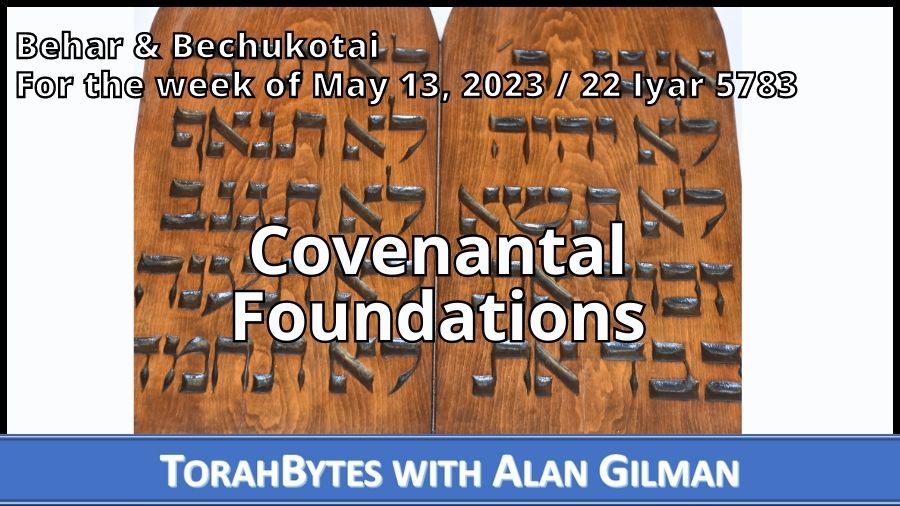For the week of May 13, 2023 / 22 Iyar 5783

Behar & Bechukotai
Torah: Vayikra/ Leviticus 25:1 – 27:34
Haftarah: Jeremiah 16:19 – 17:14
Updated version of message posted the week of June 4, 2016 / 27 Iyar 5776
But if they confess their iniquity and the iniquity of their fathers in their treachery that they committed against me, and also in walking contrary to me, so that I walked contrary to them and brought them into the land of their enemies—if then their uncircumcised heart is humbled and they make amends for their iniquity, then I will remember my covenant with Jacob, and I will remember my covenant with Isaac and my covenant with Abraham, and I will remember the land. (Vayikra/Leviticus 26:40-42)
Here in the last weekly portion of the third book of Moses, we read of the conditions under which God would restore the people of Israel to a right relationship with himself and return them to their land. The covenantal reference in the verses quoted above is key to understand God’s unique arrangement with Israel.
This week’s parsha (weekly Torah reading portion) describes the blessings of obedience and the consequences of disobedience under the covenantal arrangement established through Moses by God at Mt. Sinai. As long as Israel adhered to God’s commands, they as a nation would thrive. But should they reject God’s ways, breaking this covenant, they would experience terrible circumstances, culminating in oppression by their enemies and removal from their land.
Should this occur, which indeed it did, God made provision within the Sinai covenant for restoration to himself and to the land. But note that this provision is not based on the Sinai covenant, but on the earlier one made with Abraham, Isaac, and Jacob. Israel’s existence as a people, including their habitation and their role among the nations of the world, was established, not by Sinai through Moses, but through God’s unconditional promise to Abraham (see Bereshit/Genesis 12:1-3) and passed down to Isaac and Jacob. The Sinai covenant with its conditions of blessings came about as a result of God’s deliverance of Israel from their oppression in Egypt, a deliverance also rooted in his earlier covenant with the patriarchs. This is what we read in Shemot (the Book of Exodus):
During those many days the king of Egypt died, and the people of Israel groaned because of their slavery and cried out for help. Their cry for rescue from slavery came up to God. And God heard their groaning, and God remembered his covenant with Abraham, with Isaac, and with Jacob. (Shemot/Exodus 2:23-24)
The earlier covenant is the driving force behind all of God’s dealings with Israel. So that even if Sinai resulted in failure, which it did, the covenantal foundation would survive. That’s why God’s judgment upon Israel could never be his final word to them. Even after rejecting God by turning to other gods and suffering the threatened consequences, there would always remain a right of appeal to unconditional promises that predate Moses.
This is also why a new covenant would one day be necessary. Jeremiah in chapter thirty-one of his book looked beyond the day when these words of judgment would be fulfilled towards a new covenantal arrangement that would finally resolve the sin problem that continually beset Israel under the Sinai covenant (see Jeremiah 31:31-33). That God’s affirmation of his ongoing faithfulness to Israel is based on their being the offspring of Abraham, Isaac, and Jacob is eloquently stated immediately following:
Thus says the LORD,
who gives the sun for light by day
and the fixed order of the moon and the stars for light by night,
who stirs up the sea so that its waves roar—
the LORD of hosts is his name:
“If this fixed order departs
from before me, declares the LORD,
then shall the offspring of Israel cease
from being a nation before me forever.”Thus says the LORD:
“If the heavens above can be measured,
and the foundations of the earth below can be explored,
then I will cast off all the offspring of Israel
for all that they have done,
declares the LORD.” (Jeremiah 31:35-37)
The establishment of the New Covenant on the foundation of the patriarchs provides hope for Israel’s full eventual restoration. It’s in Romans 11:28 that we read despite Israel’s behavior, “they are beloved for the sake of their forefathers.” More than that! Knowing that the New Covenant is rooted in unconditional promises to Israel assures all its participants, Jew or Gentile, of God’s ongoing faithfulness to them.
All scriptures, English Standard Version (ESV) of the Bible